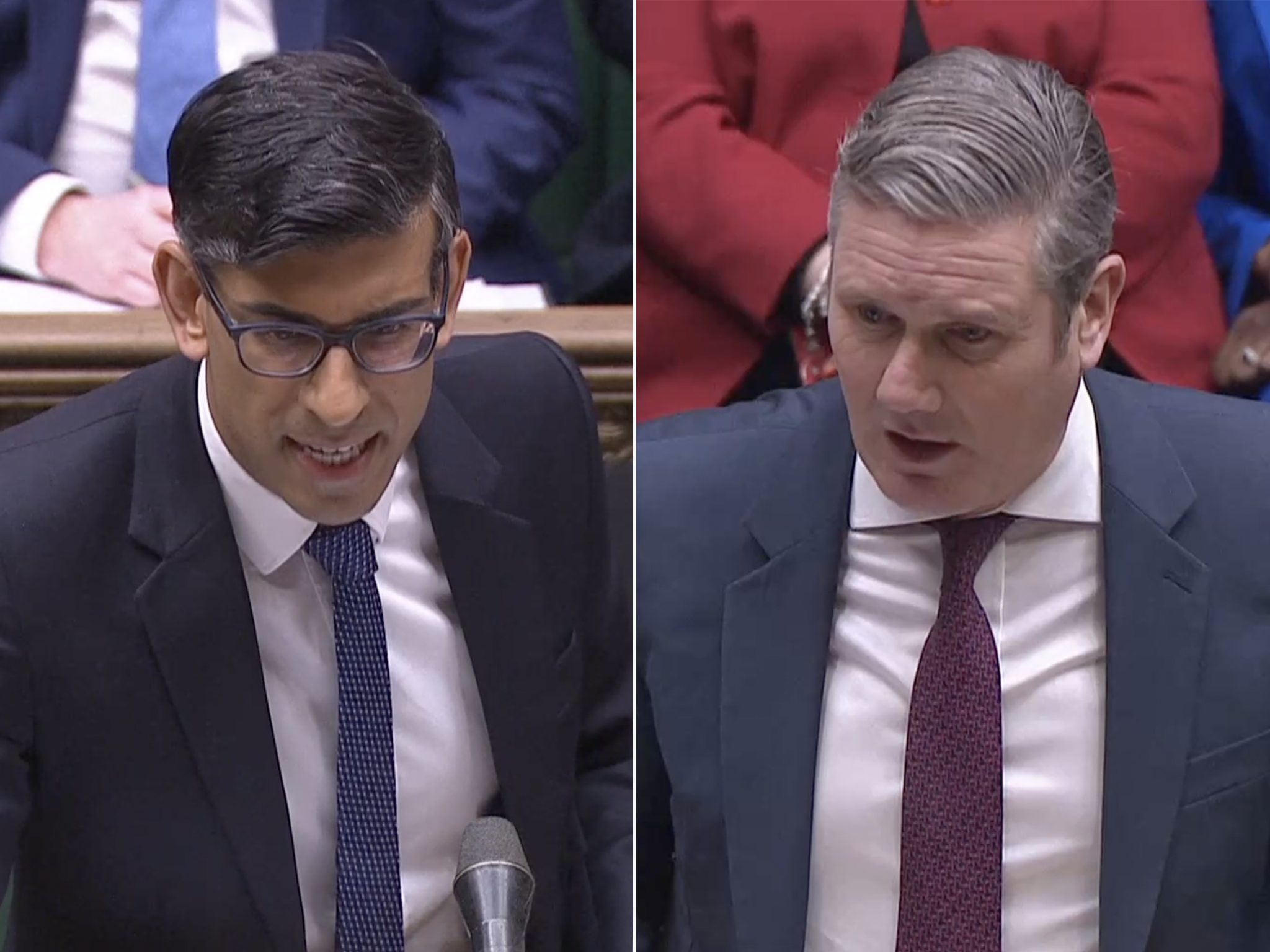Sunak has a card up his sleeve that could decide the next election
Everybody seems to think that Labour is going to win in 2024; but there’s one thing that could turn it all around, writes John Rentoul


From the moment Keir Starmer asked his first question and it was on a subject other than strikes, we knew that this was going to be an inconclusive exchange.
Inconclusive, but not pointless. Unedifying, but still rich with clues as to how the Labour leader and the prime minister will fight the next election.
Starmer continually warns his party against complacency, but he was the one who came across as complacent today. He played it safe, devoting all six of his questions to Nadhim Zahawi, Dominic Raab, Boris Johnson and their ethical tangles.
These are important matters, and The Independent is proud to have led the way in reporting them. The prime minister’s claim that, as Starmer put it, “Nobody told me; I didn’t know; I didn’t ask a question,” is unconvincing. But the Labour leader couldn’t make the charge stick that Rishi Sunak did know, when he appointed Zahawi, that his party chair was under investigation by HMRC, and so the prime minister was able to hide behind due process.
Thus the former director of public prosecutions seemed to be calling for Zahawi’s guilt to be prejudged, while Sunak said he asked for an investigation: “That’s the process that the party opposite called for, and that’s what I did.”
Starmer also demanded summary justice for Dominic Raab, the deputy prime minister who is accused of bullying his officials, and said that Boris Johnson should pay for his own legal representation for defending his role in public office. Those are demands that will come back to bite Starmer if he is ever in office himself.
Sunak carefully said that he had ordered an investigation into Raab, sitting next to him, when he was aware that “formal” complaints had been made.
The effect of Sunak’s attempt to present himself as the sea-green incorruptible upholder of natural justice was spoiled, however, by his counter-attack against Starmer for failing to stand up for Rosie Duffield – the Labour MP for Canterbury – whose views on women’s rights are more closely aligned to that of the median voter than her party’s.
This had nothing to do with the questions he was asked, and one of the great skills of the Commons is turning the subject raised to the one that the prime minister wants to talk about. Sunak didn’t bother with such finesse, and just laid into his opponent, saying that, “if he can’t be trusted to stand up for women, he can’t be trusted to stand up for Britain”. It didn’t make much sense, but it put Sunak on the right side of public opinion.
Sunak pointed out, after Starmer asked a fifth question that wasn’t about strikes, that the leader of the opposition was avoiding questions about “what people are concerned about”. He said Starmer “can’t stand up to his union bosses”, which sounds like rubbish to me, but I suspect that the focus groups say something different.
Indeed, Labour’s focus groups must be saying the same thing, which is why Starmer stayed off the subject. Later, Sunak said to a Labour backbencher that “the party opposite should say that the strikes are wrong”, which is not what the opinion polls say, but it may be that focus group research finds that – beneath the sympathy for public sector workers in principle – support for strikes in practice is fragile.
Sunak is no great parliamentary performer. He lacks the theatricality of Tony Blair, or the different circus act of Boris Johnson; but he holds the attention of the chamber and he is quick to pick up points put to him.
To take a trivial example today, Anne McLaughlin, an SNP MP, asked him about prepayment meters and urged him just to accept that they are unfair, “rather than reading out what’s in front of him”. Sunak avoided looking at his notes in his reply, and managed to sound decently sympathetic. He sometimes looks as if he is trying too hard, but he does at least look as if he is trying; Starmer, on the other hand was in danger of looking as if he was going through the motions.
The Labour leader read out some well-written lines that would go down well with people who already agreed with him. He said Sunak’s ethical shortcomings reminded him of “one of his predecessors”, but at least that predecessor “didn’t go around pretending he was a paragon”. Accusing Sunak of being less shameless than Boris Johnson is hardly a wounding attack.
Sunak, meanwhile, looked impatient to take the fight to the enemy, however unfairly and crudely. Everyone seems to think that Labour is going to win the next election, but if there are going to be TV debates during the campaign, Sunak is going to win them.






Join our commenting forum
Join thought-provoking conversations, follow other Independent readers and see their replies
Comments